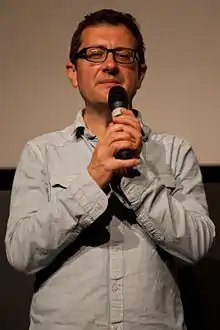Bernard Rose (director)
Bernard Rose is an English filmmaker and screenwriter, considered a pioneer of digital filmmaking.[1] He is best known for his direction of the horror films Paperhouse (1988) and Candyman (1992),[2] the historical romances Immortal Beloved (1994)[3][4] and Anna Karenina (1997), and the independent drama Ivans xtc (2000), for which he was nominated for the Independent Spirit Award for Best Director and the John Cassavetes Award. He has also been nominated for the Grand Prix des Amériques and the Venice Horizons Prize.[5]
Bernard Rose | |
|---|---|
 Rose in 2010 | |
| Born | |
| Alma mater | National Film and Television School |
| Occupation | Film director, screenwriter, actor, composer, editor |
| Years active | 1986–present |
| Awards | Golden Brussels Raven 1988 Paperhouse 2015 Frankenstein Fantasporto International Fantasy Film Special Jury Award |
| Website | bernardrosedirector |
Life and career
Rose was born in London, the son of a Jewish father and a mother who had converted to Judaism.[6] He began making super 8 films when he was 9. By 1975, he won an amateur film competition hosted by BBC which led to the broadcasting of his works. He worked for Jim Henson on the last season of The Muppet Show and then again on The Dark Crystal in 1981. He attended National Film and Television School and graduated in 1982 with a Master's in Filmmaking. After this, he moved on to directing music videos for MTV, one of which was the uncensored version of Frankie Goes To Hollywood's hit "Relax".[7]
Shortly after his production of music videos, he moved on to direct British TV films such as Prospects and then finally in 1988 directed his first major full-length film, Paperhouse. Rose got his big break into American cinema with 1992's Candyman, which has since been seen as a cult classic. Subsequently, Rose both wrote and directed Immortal Beloved, about the life and loves of Ludwig van Beethoven, as well as a remake of Leo Tolstoy's Anna Karenina.
In 2012, Rose directed Two Jacks, a drama based on Leo Tolstoy's short story "Two Hussars," starring Sienna Miller and Danny Huston.[8] In 2014, Rose directed the musical drama The Devil's Violinist.[9] This was followed by a contemporary adaptation of Mary Shelley's Frankenstein. He's currently attached to Samurai Marathon, a Japanese-produced historical drama currently in post-production.[10] He is a frequent collaborator of actor and filmmaker Danny Huston.[11][12] Rose is also a contributor to the webseries Trailers from Hell.[13]
Filmography
References
- Rose, Steve (17 December 2012). "Bernard Rose: Tolstoy, America and me". The Guardian. ISSN 0261-3077. Retrieved 27 February 2019.
- Maslin, Janet (16 October 1992). "Review/Film; Science-Fiction Horrors In a Housing Project". The New York Times. Retrieved 21 October 2017.
- Maslin, Janet (16 December 1994). "FILM REVIEW; The Music Almost Tells the Tale". The New York Times. Retrieved 21 October 2017.
- Rothstein, Edward (1 January 1995). "CLASSICAL VIEW; How Can a Movie So Right Be So Wrong?". The New York Times. Retrieved 21 October 2017.
- "Mystic Nic: Bernard Rose on Nicolas Roeg | Interview | Sight & Sound". British Film Institute. Retrieved 27 February 2019.
- "Bernard Rose profile". Luke Ford.net.
- "Frankie Goes to Hollywood "Relax"". Bernard Rose Official Site. Retrieved 21 October 2017.
- Holden, Stephen (18 October 2013). "A Gene That Doesn't Recede". The New York Times. Retrieved 21 October 2017.
- Schager, Nick (28 January 2015). "Film Review: 'The Devil's Violinist'". Variety. Retrieved 21 October 2017.
- Clarke, Stewart (6 February 2019). "HanWay Boards Bernard Rose's 'Samurai Marathon,' Jeremy Thomas Producing (EXCLUSIVE)". Variety. Retrieved 27 February 2019.
- "10 Questions for Director Bernard Rose | The Arts Desk". theartsdesk.com. Retrieved 27 February 2019.
- Thompson, Anne (12 June 2013). "LAFF: Bernard Rose and Danny Huston Reunite with 'Boxing Day,' Third in Tolstoy Series (VIDEO)". IndieWire. Retrieved 27 February 2019.
- "Bernard Rose Archives". Trailers From Hell. Retrieved 27 February 2019.
- Vero. "Acclaimed Director Bernard Rose Releases The Hurdy Gurdy Man, Based on the Life of Composer Franz Schubert, Exclusively on Vero". www.prnewswire.com. Retrieved 27 February 2019.